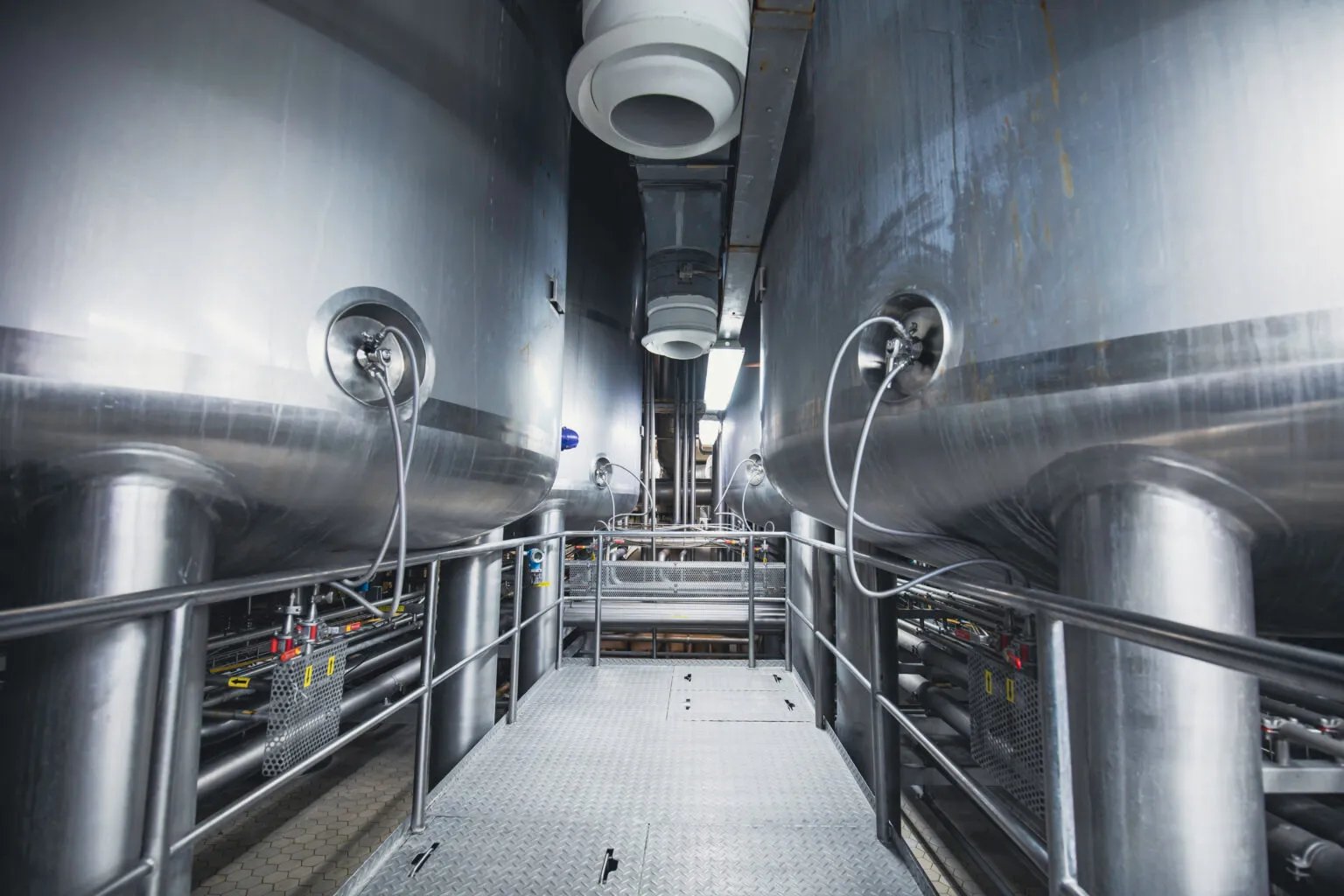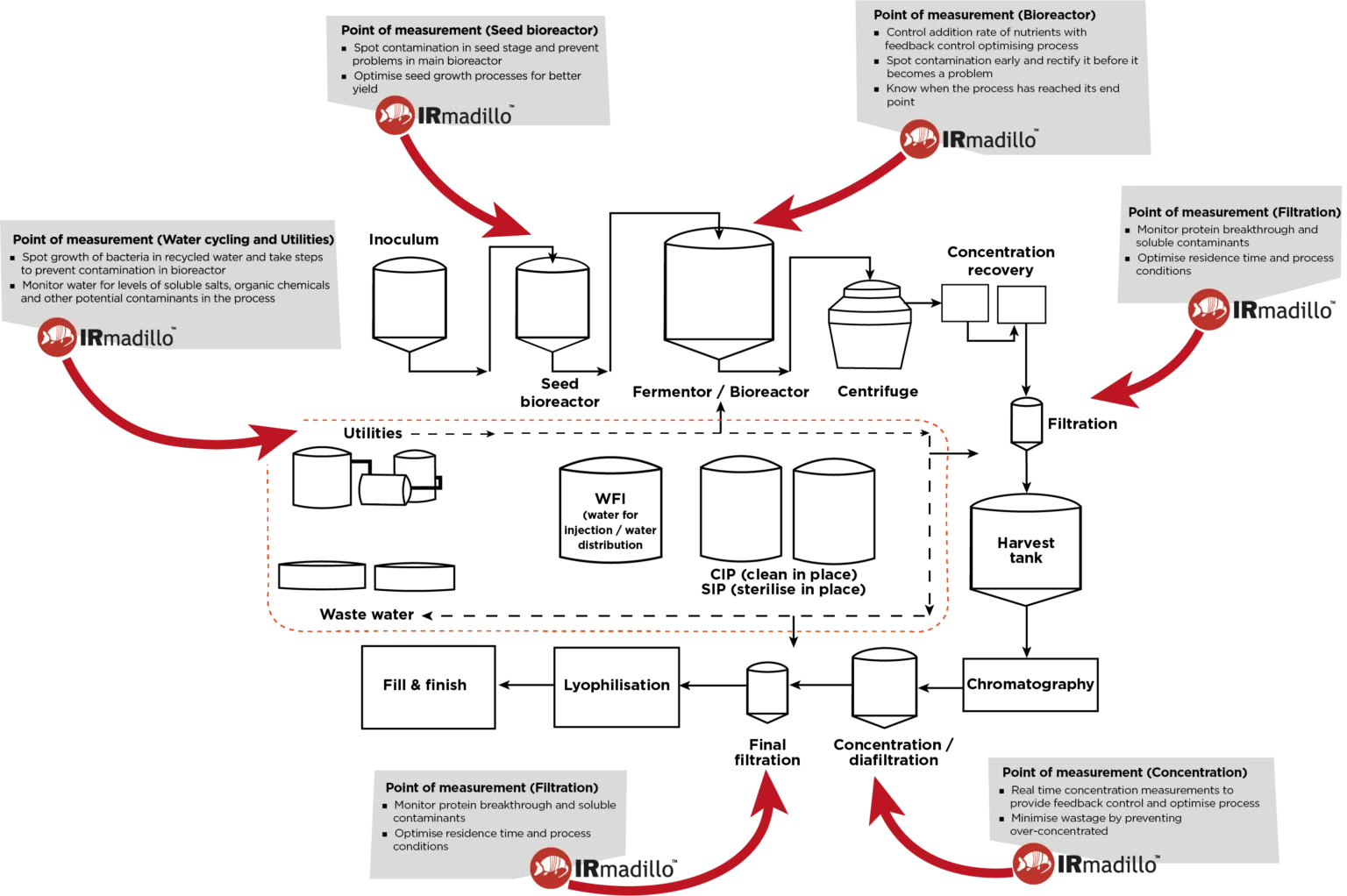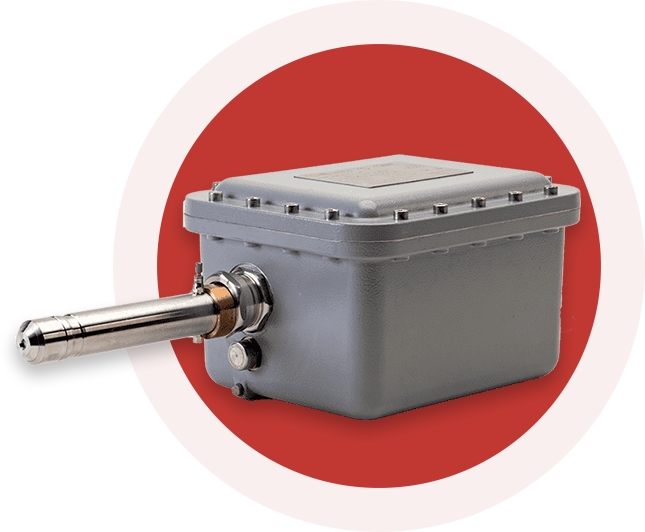Industrial Biotechnology
Industrial biotechnology is one of the most promising areas of development in global science and technology, with huge potential as a source of new materials, specialty chemicals and foodstuffs.


Industrial Biotechnology
The IRmadillo for Monitoring Industrial Biotechnology, Fermentation and Cell Culture
Industrial biotechnology is one of the most promising areas of development in global science and technology, with huge potential as a source of new materials, specialty chemicals and foodstuffs. Complicated mixtures, variable feedstocks, changing biomass concentrations and the combination of solids, liquids and gases in the same process make monitoring a challenge. Process improvements, efficiency drives and cost reductions all require online measurement – so how can this be achieved in such challenging conditions?
Taking samples off-line is one method, but by the time the samples have been purified (for example by spinning down in a centrifuge) and taken to a suitable technique – such as HPLC – it is almost certain that the process has changed from when the sample was taken. Simple online measurements such as pH, temperature, dissolved oxygen and optical density can give limited information on the process, but do not give you the chemical concentrations or enable you to make advanced efficiency improvements such as closed-loop control. All this changes with the introduction of the IRmadillo FTIR Spectrometer.
The Keit IRmadillo has been specifically designed to withstand both caustic clean-in-place (CIP) and sterilize-in-place (SIP) processes, meaning the instrument can be installed once and then forgotten about. It works in aerobic and anaerobic processes, continuous or batch, cell culture and fermentation. So no matter what industrial biotechnology process you operate, the IRmadillo can help you improve it, drive down costs and save money.

Using the IRmadillo to
Monitor Industrial Biotechnology
The world of industrial biotechnology (IB) is just as diverse as classical chemistry, with a number of different processes and needs focused on fermentation and cell culture. Some examples are:
- Biomass growth – growing fungi as a source of mycoprotein, or growing yeast as an ingredient in brewing, bread making and biofuels
- Production of enzymes through both fermentation and mammalian cell culture
- Renewable sources of chemical building blocks through fermentation (such as alcohols, glycols, ethers etc.)
- Enzymatic hydrolysis of biomass as a source of chemical building blocks and sugars

The exact process for each of these is subtly different, but in all cases they will consist of an upstream feedstock addition, the core reaction vessel (either aerobic or anaerobic) and downstream purification and processing.
The IRmadillo can easily monitor the following components:
- Sugars
- Alcohols
- Organic acids (lactic, acetic, pyruvic, formic etc...)
- Protein, enzymes and antibodies
- Biopolymers
- Nutrients, inorganic salts and enzymes (sulfate, nitrate etc...)

Fermentation, cell culture and the IRmadillo
Control of nutrients and feedstock in the bioreactor can have an enormous impact on the efficiency of the bioprocess. For example, in a fed-batch process you may wish to control the sugar dose to optimize production of the product rather than biomass growth (or vice versa), and real-time measurement of sugar levels enables this regardless of uptake rate. Likewise, a key nutrient may be required for cell health, but too high a concentration may lead the process down an undesirable pathway. Alternatively, the product of the process may be toxic to the organism being used, and in a continuous process it is beneficial to run at as high a concentration as possible for economic reasons – but not so high the organism is killed. The IRmadillo allows you to monitor all of these concentrations at once and have the fine control required to achieve an optimum process.
Downstream purification can be controlled by real-time monitoring of the process streams, for example, checking for protein breakthrough on a filtration process, or identifying a contaminant in the final product. Lastly, by monitoring the recycled water it is possible to quantify key markers such as lactic and acetic acids that may be indicative of a bacterial infection that needs resolving – especially in processes that do not use SIP.
What about other instruments – Raman, near infrared (NIR), & refractive index monitors?
Raman spectroscopy is similar to the FTIR that drives the IRmadillo’s process monitoring, but it can be very strongly and negatively affected by particles and bubbles in the solution, as well as showing strong fluorescence in many cases.
Near infrared (NIR) provides much less specific information than FTIR – they’re very good in some industries, but not up to the demanding job of bio-process monitoring.
Off-gas analyzers monitor the concentrations of gases as they're evolved from a biochemical process. They can be used to infer reaction progression, but do not give information of what remains dissolved - for example, sugars or proteins, and so have limited us.

The IRmadillo for
Industrial Biochemical Production
Installations in batch reactors typically do not show fouling, as the CIP process of the bioreactor cleans the probe and prevents buildup of biofilm. Continuous processes can start to show biofouling over time. This can be identified by the probe itself running a scan to check if it’s clean and alerting the user that it needs cleaning. (If installed in a bypass loop this can be performed easily).
The IRmadillo was designed first for robustness and reliability, which means it has a probe slightly larger in diameter than smaller scale processes are used to. The IRmadillo has a range of options, including: 40 mm Ingold port, sanitary fitting port or flanged fitting option enabling the instrument to be installed directly into larger vessels and pipework.
There are also options using recirculation loops and flow cells, so just because the probe is larger than the ports on your process that does not mean you cannot benefit from the IRmadillo!
The IRmadillo uses a phenomenon known as attenuated total reflection (ATR) to shine light into the mixture whilst maintaining a seal on the end of the probe. This means that the light from the instrument penetrates about 2 µm into the liquid. As a result, the IRmadillo “sees” the liquid very strongly, and the solids are much less visible (as they are larger than the penetration depth of light).
As a result, the IRmadillo is almost completely unaffected by solids loading, and has been shown to work in very high solid loading slurries and syrups. Whilst the instrument has also been used to correlate with biomass levels, we recommend other technologies such as capacitance measuring to truly monitor your biomass.
Explore our
Application Library
There’s more to find out. Feel free to download and read our application notes and
brochure by browsing our application library.
The IRmadillo for
Industrial Biotechnology Processes
If you purchase the IRmadillo for industrial biotechnology you will receive:
- IRmadillo process analyzer
- Interface and mounting accessories to integrate with your process (following a consultation with your engineering team)
- IRmadillo controller
- Calibration services
- Ongoing technical and recalibration support (as per your warranty or maintenance contract)
Contact Us
Download
IRmadillo Brochure
Keit enables better control of industrial processes by providing real-time chemical reaction analysis of liquids. The IRmadillo mid-infrared spectrometer has practical applications across multiple industries.
